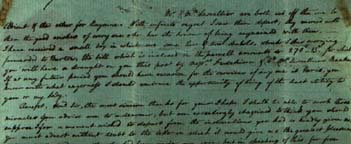These letters graciously have been shared with the Victorian Web by Eunice and Ron Shanahan; they have been taken from their website. The letters give an insight into the daily lives and concerns of 'ordinary' people without whom history would not exist. The letters are a wonderful example of how much history may be gleaned from such sources.

This is the second of two letters written in 1792 from Paris to London, both addressed to Sir Richard Heron, Baronet, of Grosvenor Square. The first letter was written on 6 February. This letter, dated Paris, March 20, 1792 addressed to “The Honble Sr. Rd. Heron, Grosvenor Square, London” was received three days later. It also has the P. PAYE PARIS in red and a large Foreign Office Bishop mark of MR 23 in a bisected circle with the month above the day.
The manuscript charge mark of 10d on the front of the letter, would have been put on for the accounting between the Foreign Office section and the General Post section. However, the manuscript '8' on the back of the letter is inexplicable, but could possibly be the number of letters held to be delivered that day to Sir Richard — a kind of reminder to the postman.
Prior to the introduction of the envelope, a letter was a sheet of paper folded, the sides tucked in, and then sealed with either a wafer or a blob of red sealing wax. This letter has been torn open roughly, leaving an unbroken impression of the seal. It is an oval showing a woman's head looking somewhat like the Wyon Medal of Queen Victoria, which was used as a basis for the Penny Black postage stamp.
This letter is a good example of the grovelling that was expected of those in a lowly situation towards the nobility. The class structure was an accepted fact of life at that time, which was parodied in this jingle :-
God bless the Squire and his relations,
and keep us all in our proper stations."
I am very glad to be living in the 20th century when this grovelling is no longer expected, as I would really dislike having to be so subservient. The letter begins:
"Hon'd Sir,
Msieur and Madame Lescallier are both set off, the one to L'Orient and the
other for Bayonne.
With infinite regret I saw them depart. They carried with them the good wishes
of everyone who has the honour of being acquainted with them.
I have received a small box in which are some lace and two shawls, which I this morning forwarded to Burtons. The bill, which is inclosed in the parcell amounts to 270. 15.0d for which you will have a draught on you this post by Messrs Fulchiron & Co. Mr Lescallier's Bankers.
If at any future period you should have occasion for the services of anyone at Paris, you know with what eagerness I should embrace the opportunity of being of the least utility for you or my Lady."
He then continues:
'Accept Hon'd Sir,
the most sincere thanks for your letter. I hope I shall be able to work these miracles you advise me to endeavour, but am exceedingly chagrined to think you should suppose I for a moment wish'd to depart from the instructions you had so kindly given me."
[Reading this letter makes me appreciate even more the fictional characters drawn by Jane Austen — the writer, J. Dring, is Mr Collins in Pride and Prejudice to the life!]
You know, Sir, the great deference I have always paid to your advice and the many marks of kindnesses you have shown me would stamp my character with the basest ingratitude if I hesitated to follow it.
Let me therefore Hon'd Sir, return you my most sincere acknowledgements for
the kind offer of giving yourself the trouble to read and preserve ostensible
letters from me, be assured I shall do my utmost to merit and preserve this
new mark of kindness, and beg you will permit me to begin your kind plan in
the space of time you have mentioned.
Tho' I may have forgot for a time how much I owe you, yet I have preserved
your letters with the most scrupulous care, it was indolence made me go astray,
gratitude never quitted me tho' she lay some time smothered."
There is further paragraph of self-blame and excuses, and apologies,
My obscurity in my former letter was occasioned by my ignorance, the negotiation was scarcely begun, I had no other information on the subject. The Count de Pirocq is the father of the young gentleman over whom I am placed, the family is very respectable & formerly of great consequence. I am to be with Mdme St Aignan at her seat in the ci-devant province of Maine, on the coast opposite to England, about 7 leagues from Caen in Normandy where she passes her summers.
and he finally adds this gem:
As I only knew I was to write last night you will I hope Sir, excuse my brevity.
J. Dring
Beg my Lady to accept the respectful acknowledgements of Hon'd Sir, Yr most
grateful and obedient humble servant
J. Dring

3 December 2002